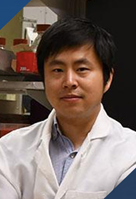ETEP Faculty
 Sara Dubowsky Adar, ScD, MHS.
Dr. Adar uses modern principles of epidemiology, environmental
health, exposure science, and biostatistics to characterize the impacts of environmental
hazards on human health. Her research primarily focuses on the effects of air pollution
and noise on healthy aging, with additional interests in global health, extreme weather
events, and intervention strategies to improve health. She currently leads several
large cohort studies on the impacts of exposures on cognitive aging and dementia.
Dr. Adar is an Associate Editor at Environmental Health Perspectives and a member
of the Review Committee for the Health Effects Institute. She also formerly served
as the Secretary/Treasurer of the International Society for Environmental Epidemiology
and was awarded the Sandra A. Daugherty Award for Excellence in Cardiovascular Epidemiology
from the American Heart Association and the Excellence in Teaching Award from the
University of Michigan School of Public Health.
Sara Dubowsky Adar, ScD, MHS.
Dr. Adar uses modern principles of epidemiology, environmental
health, exposure science, and biostatistics to characterize the impacts of environmental
hazards on human health. Her research primarily focuses on the effects of air pollution
and noise on healthy aging, with additional interests in global health, extreme weather
events, and intervention strategies to improve health. She currently leads several
large cohort studies on the impacts of exposures on cognitive aging and dementia.
Dr. Adar is an Associate Editor at Environmental Health Perspectives and a member
of the Review Committee for the Health Effects Institute. She also formerly served
as the Secretary/Treasurer of the International Society for Environmental Epidemiology
and was awarded the Sandra A. Daugherty Award for Excellence in Cardiovascular Epidemiology
from the American Heart Association and the Excellence in Teaching Award from the
University of Michigan School of Public Health.
 Kelly Marie Bakulski, PhD
Dr. Bakulski's research team goal is to
understand the environmental and genetic etiologies of neurological disorders, and
in the process promote the conduct of rigorous science and the development of scientific
expertise. Dr. Bakulski is an environmental health scientist with expertise in life
course heavy metals exposure testing with neurodevelopment and neurodegeneration.
She is also a molecular epidemiologist with experience conducting analyses across
multiple levels of the genome, including the epigenome and the transcriptome. Dr.
Bakulski's research incorporates population approaches and laboratory experiments
to develop biomarker and cell type tools that inform molecular epidemiology inferences.
Dr. Bakulski is passionate about teaching and mentoring.
Kelly Marie Bakulski, PhD
Dr. Bakulski's research team goal is to
understand the environmental and genetic etiologies of neurological disorders, and
in the process promote the conduct of rigorous science and the development of scientific
expertise. Dr. Bakulski is an environmental health scientist with expertise in life
course heavy metals exposure testing with neurodevelopment and neurodegeneration.
She is also a molecular epidemiologist with experience conducting analyses across
multiple levels of the genome, including the epigenome and the transcriptome. Dr.
Bakulski's research incorporates population approaches and laboratory experiments
to develop biomarker and cell type tools that inform molecular epidemiology inferences.
Dr. Bakulski is passionate about teaching and mentoring.
 Stuart Batterman, PhD
Stuart Batterman, PhD
Dr. Batterman's research and teaching interests address environmental impact assessment,
human exposure and health risk assessment, and environmental management. His research
addresses both theoretical work and applied laboratory and field studies. He is particularly
interested in improving exposure measures that can be used in risk assessments and
epidemiological studies; measuring toxic compounds including volatile organic compounds
(VOCs) found as pollutants in drinking water, ambient and indoor air, and statistical
and modeling methods that can be used to interpret and extend available measurements.
His research is applied to contemporary problems including ambient and indoor air
quality, environmental epidemiology, policy analysis, environmental engineering, environmental
justice, and life cycle analysis. His international projects include training and
research programs in the environmental sciences and engineering in Africa (especially
South Africa) and Europe (especially Portugal, Russia and Finland). He directs the
Hazardous Substances Academic Training Program and the Pilot Project Research Program
in the NIOSH-supported Education and Resource Center. Professor, Faculty of Science
and Technology, University of Coimbra, Portugal.
 Simone Charles, PhD, MS
Dr. Charles is a Clinical Associate Professor of
Environmental Health Sciences at the University of Michigan, School of Public Health.
She also severs as the Associate Chair of the Curriculum Committee. Her research began
in exposure science where her work included risk assessment modeling for environmental
contaminants in soils, air contaminant exposure assessments in various indoor settings,
and tobacco smoke chemical tracer identification and efficacy determination in urban
households with asthmatic children. Her work has since transitioned to public health
practice and research translation working with academic-community partnerships to
address health impacts of environmental hazard exposures on underserved rural and
urban communities. Her work has included addressing health disparities around tobacco
smoking, lead hazard exposure, migrant farmworker health, minority adolescent health,
asthma reduction, and healthy housing. Her practice has informed her contributions
to state and local partnerships such as her work with the Georgia Department of Public
Health to create a statewide strategic plan to reduce lead exposures through healthy
housing and lead exposure prevention strategies. The intersection of curriculum develop,
environmental health literacy, and workforce development to address health disparities
in underserved communities continues to be a major focus of her work. For example,
her practice-based adolescent-focused research will lay the groundwork informing a
place-based, culturally appropriate, strategy for youth to engage in advancing environmental
health, increasing environmental health literacy, and proposing policy suggestions
and decision-making in response to environmental justice. It will also provide opportunities
to empower youth to take action to educate themselves, their peers and their community
on ways to reduce or eliminate risk factors within their control, while actively working
to change modifiable environmental risk factors. She was recently invited to serve
as the Associate Editor for Environmental Justice journal. She was a 2013 NIH NIMHD
Translational Health Disparities scholar and 2012 Health Equity Leadership Institute
fellow.
Simone Charles, PhD, MS
Dr. Charles is a Clinical Associate Professor of
Environmental Health Sciences at the University of Michigan, School of Public Health.
She also severs as the Associate Chair of the Curriculum Committee. Her research began
in exposure science where her work included risk assessment modeling for environmental
contaminants in soils, air contaminant exposure assessments in various indoor settings,
and tobacco smoke chemical tracer identification and efficacy determination in urban
households with asthmatic children. Her work has since transitioned to public health
practice and research translation working with academic-community partnerships to
address health impacts of environmental hazard exposures on underserved rural and
urban communities. Her work has included addressing health disparities around tobacco
smoking, lead hazard exposure, migrant farmworker health, minority adolescent health,
asthma reduction, and healthy housing. Her practice has informed her contributions
to state and local partnerships such as her work with the Georgia Department of Public
Health to create a statewide strategic plan to reduce lead exposures through healthy
housing and lead exposure prevention strategies. The intersection of curriculum develop,
environmental health literacy, and workforce development to address health disparities
in underserved communities continues to be a major focus of her work. For example,
her practice-based adolescent-focused research will lay the groundwork informing a
place-based, culturally appropriate, strategy for youth to engage in advancing environmental
health, increasing environmental health literacy, and proposing policy suggestions
and decision-making in response to environmental justice. It will also provide opportunities
to empower youth to take action to educate themselves, their peers and their community
on ways to reduce or eliminate risk factors within their control, while actively working
to change modifiable environmental risk factors. She was recently invited to serve
as the Associate Editor for Environmental Justice journal. She was a 2013 NIH NIMHD
Translational Health Disparities scholar and 2012 Health Equity Leadership Institute
fellow.
 Justin Colacino, PhD
Justin Colacino, PhD
Dr. Justin Colacino's research focuses on understanding environmental and dietary
factors in the development of chronic diseases like cancer. Specifically, the goal
of his research is to characterize the susceptibility of normal stem cell populations
to environmental stress, to understand the link between dysregulated development and
disease. Of particular interest are understanding the changes that occur at the epigenetic
and transcriptional level, changes which affect not only gene expression but also
how progenitor cells differentiate and divide. His research group combines wet lab
bench work and bioinformatic and statistical analysis of large scale genomic and epidemiologic
data sets to translate findings from in vitro models to the population level. Dr.
Colacino is an active member of the Society of Toxicology (SOT) and the American Association
for Cancer Research (AACR) and serves on the Editorial Review Board of Environmental
Epigenetics and the Editorial Boards of Toxicological Sciences and Epigenomes.
 Dana Dolinoy, PhD
Dana Dolinoy, PhD
Dr. Dolinoy has a broad background in genomics and toxicology, with specific interest
in epigenetic research, including environmental epigenomics and the developmental
origins of health and disease. Her research integrates the work of toxicologists,
epidemiologists, and bioinformaticians to fully characterize effects of environmental
factors on the epigenome while developing precision environmental epigenomics tools
for the wider toxicological research and therapeutic communities, with a particular
focus on metabolic syndrome, neurodevelopmental disorders and cancer. Additionally
she serves as the Director of the University of Michigan NIEHS P30 Core Center, entitled
'Lifestage Environmental Exposures and Diseases' (M-LEEaD) and as Faculty Director
of the Michigan Medical Center's Epigenomics Core. Overall, Dr. Dolinoy has a strong
commitment to environmental and nutritional epigenomics research, especially as it
relates to sensitive subpopulations, including those at risk for very early environmental
insults that set the stage for adult disease risk, such as cancer.
 J. Tim Dvonch, PhD
Dr.Dvonch's research interests and experience broadly
reside in the assessment, characterization, source identification, and risk communication
of human exposures and inhalation health effects of air pollutants. For exposure assessment,
his specific interests are in the laboratory development and 'real-world' field-evaluation
and application of methodologies and techniques for improved exposure assessment to
air pollutants. These primarily include the mass, number, as well as biological and
chemical composition of ambient particles for exposure assessment at the community,
micro-environmental, and personal level. His interests in the application of these
methods include source identification and apportionment of the pollutants through
the use of receptor models, with the ultimate goal of informing policy and decision-making
processes to improve human health through the reduction of these exposures. Dr. Dvonch
has contributed to numerous community-based human population studies and animal model
studies of exposure addressing synergies between quantitatively defined air pollution
exposures and other variables in the causation of adverse health effects. His research
has addressed differing risks of air pollution exposure and health impacts related
to disparities in socio-economic status, disease (or pre- disease)-status, geographic
location of residence, chemical and biological composition, and specific emission
sources of pollutants. Several of these studies have identified adverse health outcomes
in both vulnerable subpopulations as well as healthy people due to exposure to specific
chemical components of air pollution, as well as specific emission sources of pollution.
J. Tim Dvonch, PhD
Dr.Dvonch's research interests and experience broadly
reside in the assessment, characterization, source identification, and risk communication
of human exposures and inhalation health effects of air pollutants. For exposure assessment,
his specific interests are in the laboratory development and 'real-world' field-evaluation
and application of methodologies and techniques for improved exposure assessment to
air pollutants. These primarily include the mass, number, as well as biological and
chemical composition of ambient particles for exposure assessment at the community,
micro-environmental, and personal level. His interests in the application of these
methods include source identification and apportionment of the pollutants through
the use of receptor models, with the ultimate goal of informing policy and decision-making
processes to improve human health through the reduction of these exposures. Dr. Dvonch
has contributed to numerous community-based human population studies and animal model
studies of exposure addressing synergies between quantitatively defined air pollution
exposures and other variables in the causation of adverse health effects. His research
has addressed differing risks of air pollution exposure and health impacts related
to disparities in socio-economic status, disease (or pre- disease)-status, geographic
location of residence, chemical and biological composition, and specific emission
sources of pollutants. Several of these studies have identified adverse health outcomes
in both vulnerable subpopulations as well as healthy people due to exposure to specific
chemical components of air pollution, as well as specific emission sources of pollution.
 Eva Feldman, MD, PHD
Dr. Feldman is one of the
world’s leading authorities on neurodegenerative disease. Currently, she serves as
the University of Michigan James W. Albers Distinguished University Professor and
the Russell N. DeJong Professor of Neurology at Michigan Medicine. She is also the
Director of the NeuroNetwork for Emerging Therapies and ALS Center of Excellence at
Michigan Medicine. Feldman has made contributions to biomedical research and clinical
care in many critical areas of neurodegenerative disease. Her primary focus has been
on amyotrophic lateral sclerosis (ALS), Alzheimer's disease, cognitive decline, and
the neurologic complications of diabetes and obesity, as well as how environmental
toxins affect the nervous system. She also has conducted pioneering research on developing
stem cell therapies to treat these diseases. Feldman is annually listed in Best Doctors
in America, is a member of the Association of American Physicians and the National
Academy of Medicine, and is a Fellow of the American Association for the Advancement
of Science. Feldman has authored over 530 articles and 74 book chapters (Google Scholar
h-index = 117) with >55,000 citations. She has been continuously NIH-funded since
1989 and has received numerous awards and honors throughout her remarkable career.
Eva Feldman, MD, PHD
Dr. Feldman is one of the
world’s leading authorities on neurodegenerative disease. Currently, she serves as
the University of Michigan James W. Albers Distinguished University Professor and
the Russell N. DeJong Professor of Neurology at Michigan Medicine. She is also the
Director of the NeuroNetwork for Emerging Therapies and ALS Center of Excellence at
Michigan Medicine. Feldman has made contributions to biomedical research and clinical
care in many critical areas of neurodegenerative disease. Her primary focus has been
on amyotrophic lateral sclerosis (ALS), Alzheimer's disease, cognitive decline, and
the neurologic complications of diabetes and obesity, as well as how environmental
toxins affect the nervous system. She also has conducted pioneering research on developing
stem cell therapies to treat these diseases. Feldman is annually listed in Best Doctors
in America, is a member of the Association of American Physicians and the National
Academy of Medicine, and is a Fellow of the American Association for the Advancement
of Science. Feldman has authored over 530 articles and 74 book chapters (Google Scholar
h-index = 117) with >55,000 citations. She has been continuously NIH-funded since
1989 and has received numerous awards and honors throughout her remarkable career.
 Jackie Goodrich, PhD
Dr. Goodrich's research interests combine
toxicology, epidemiology and epigenomics with the goal of identifying environmental
exposures and their mechanisms that contribute to disease susceptibility at various
life-stages (in utero, early childhood, and adulthood). Epigenetic modification by
environmental factors is one mechanism that can link exposures to toxicity and disease
outcomes. Dr. Goodrich is assessing the impact of exposures from the workplace (e.g.
firefighting) or the broader environment (e.g., lead, phthalates, PFAS) on epigenetic
modifications (DNA methylation) in epidemiological cohorts from around the globe using
both candidate gene and epigenome-wide approaches. She integrates data on exposures,
DNA methylation, and health outcomes to better understand disease risk from exposures
at vulnerable life-stages. Dr. Goodrich is a co-Leader of the DoGoodS-Pi environmental
epigenetics laboratory. She is also co-Leader of the Pan Omics and Data Sciences Core
of the Michigan Lifestage Environmental Exposures and Disease (M-LEEaD) Center.
Jackie Goodrich, PhD
Dr. Goodrich's research interests combine
toxicology, epidemiology and epigenomics with the goal of identifying environmental
exposures and their mechanisms that contribute to disease susceptibility at various
life-stages (in utero, early childhood, and adulthood). Epigenetic modification by
environmental factors is one mechanism that can link exposures to toxicity and disease
outcomes. Dr. Goodrich is assessing the impact of exposures from the workplace (e.g.
firefighting) or the broader environment (e.g., lead, phthalates, PFAS) on epigenetic
modifications (DNA methylation) in epidemiological cohorts from around the globe using
both candidate gene and epigenome-wide approaches. She integrates data on exposures,
DNA methylation, and health outcomes to better understand disease risk from exposures
at vulnerable life-stages. Dr. Goodrich is a co-Leader of the DoGoodS-Pi environmental
epigenetics laboratory. She is also co-Leader of the Pan Omics and Data Sciences Core
of the Michigan Lifestage Environmental Exposures and Disease (M-LEEaD) Center.
 Stephen Goutman, MD, MS
Dr. Stephen Goutman’s clinical
and research expertise is focused on Amyotrophic lateral sclerosis (ALS), a progressive,
fatal neurodegenerative disease with limited treatment options. He is currently the
Director of the University of Michigan Pranger ALS Clinic, an ALS Association Certified
Center of Excellence, where a multidisciplinary team provides comprehensive and compassionate
care to persons with ALS and their families. Inspired by these patients, Dr. Goutman’s
research focuses on identifying new mechanisms and therapies for ALS. Specifically,
he has been seeking to understand the genetic and environmental interactions that
alter susceptibility to ALS, especially in the State of Michigan which has some of
the highest rates of ALS in the country. With funding from the National Institutes
of Health, the Centers for Disease Control and Prevention, and the ALS Association,
he is discovering environmental risk factors associated with the onset and progression
of ALS by collecting epidemiologic exposure surveys and biofluids from individuals
with and without ALS. His research shows a link between ALS and pesticides, and his
recent article on this work received widespread attention, as this important finding
may help solve the mystery of ALS. Dr. Goutman also collaborates with teams of scientists
to identify the immune system’s role in ALS and find new drugs that can address these
changes in the immune system. The ultimate goal is to one day make ALS a preventable
disease. Dr. Goutman serves as the site principal investigator of several multi-site
clinical trials focused on identifying new ALS treatments. He is an active participant
with the Northeast ALS Consortium (NEALS) and has close to a decade of experience
leading ALS clinical trials at University of Michigan.
Stephen Goutman, MD, MS
Dr. Stephen Goutman’s clinical
and research expertise is focused on Amyotrophic lateral sclerosis (ALS), a progressive,
fatal neurodegenerative disease with limited treatment options. He is currently the
Director of the University of Michigan Pranger ALS Clinic, an ALS Association Certified
Center of Excellence, where a multidisciplinary team provides comprehensive and compassionate
care to persons with ALS and their families. Inspired by these patients, Dr. Goutman’s
research focuses on identifying new mechanisms and therapies for ALS. Specifically,
he has been seeking to understand the genetic and environmental interactions that
alter susceptibility to ALS, especially in the State of Michigan which has some of
the highest rates of ALS in the country. With funding from the National Institutes
of Health, the Centers for Disease Control and Prevention, and the ALS Association,
he is discovering environmental risk factors associated with the onset and progression
of ALS by collecting epidemiologic exposure surveys and biofluids from individuals
with and without ALS. His research shows a link between ALS and pesticides, and his
recent article on this work received widespread attention, as this important finding
may help solve the mystery of ALS. Dr. Goutman also collaborates with teams of scientists
to identify the immune system’s role in ALS and find new drugs that can address these
changes in the immune system. The ultimate goal is to one day make ALS a preventable
disease. Dr. Goutman serves as the site principal investigator of several multi-site
clinical trials focused on identifying new ALS treatments. He is an active participant
with the Northeast ALS Consortium (NEALS) and has close to a decade of experience
leading ALS clinical trials at University of Michigan.
 Carina Gronlund, PhD, MPH
Dr. Gronlund is an environmental epidemiologist with funding from
the National Institute of Environmental Health Sciences and the National Science Foundation.
With Detroit community and State of Michigan government partners, she studies how
social, economic, health, and built environment characteristics and air quality affect
vulnerability to extreme heat, extreme precipitation, and pollen. This research will
help cities understand how to adapt to heat, heat waves, higher pollen levels, and
heavy rainfall in a changing climate.
Carina Gronlund, PhD, MPH
Dr. Gronlund is an environmental epidemiologist with funding from
the National Institute of Environmental Health Sciences and the National Science Foundation.
With Detroit community and State of Michigan government partners, she studies how
social, economic, health, and built environment characteristics and air quality affect
vulnerability to extreme heat, extreme precipitation, and pollen. This research will
help cities understand how to adapt to heat, heat waves, higher pollen levels, and
heavy rainfall in a changing climate.
 Alexis J. Handal, PhD, MPH
Alexis J. Handal, PhD, MPH
Dr. Handal’s research interests include environmental and occupational epidemiology,
reproductive epidemiology, and child health and development examined within social,
political, and economic contexts and in global settings. Her research focuses on marginalized
populations who are traditionally underrepresented in research, including Latine and
Indigenous populations in the U.S. and Latin America and those who are most exposed
to hazardous work conditions and environmental toxins, such as farmworkers, with a
particular focus on women and their children. Her community-engaged research approach
uses a health equity lens focusing on the interconnection between occupational stress,
toxic exposures and difficult social environments, in the context of precarious employment,
on maternal health and child development. Dr. Handal’s research interests also include
examining the health impact of worker’s rights including an examination of worker
protection legislation and the impact on pregnant employees, and the impact of occupational
stress and gender discrimination on maternal and child health.
 Sean Harris, PhD
Dr. Harris's research aims to advance
our understanding of how environmental toxicants contribute to adverse pregnancy outcomes
such as preterm birth and preeclampsia. His research uses a combination of approaches
including transcriptomics, metabolomics, primary tissue models and computational/data
mining methods to investigate molecular mechanisms of toxicant effects on the placenta
and fetal membranes. Dr. Harris also investigates extracellular vesicles as a source
for circulating biomarkers of toxicant effects on the placenta.
Sean Harris, PhD
Dr. Harris's research aims to advance
our understanding of how environmental toxicants contribute to adverse pregnancy outcomes
such as preterm birth and preeclampsia. His research uses a combination of approaches
including transcriptomics, metabolomics, primary tissue models and computational/data
mining methods to investigate molecular mechanisms of toxicant effects on the placenta
and fetal membranes. Dr. Harris also investigates extracellular vesicles as a source
for circulating biomarkers of toxicant effects on the placenta.
 Steven Huang, MD
Steven Huang, MD
Steven Huang, MD is an Associate Professor in the Department of Internal Medicine,
Division of Pulmonary and Critical Care Medicine at the University of Michigan. He
did his undergraduate studies at Northwestern University in Evanston (1994-1997),
and went to Medical School at Northwestern University in Chicago (1997-2001). After
completing his internship and residency in Internal Medicine also at Northwestern,
he came to the University of Michigan for fellowship in Pulmonary and Critical Care
Medicine (2004-2007). He stayed on as faculty, first as a Clinical Lecturer, and then
as a tenured-track faculty member. Dr. Huang's research focuses on understanding how
epigenetic modifications contribute to the development of chronic lung diseases, especially
idiopathic pulmonary fibrosis (IPF). He focuses on studying how fibroblasts contribute
to disease pathology and how patients develop variability in disease progression.
His work also examines how air pollution contributes to the development of asthma.
Dr. Huang is in charge of helping maintain the U of M ILD Lung Biorepository. Dr.
Huang is an active member of several pulmonary subspecialty societies, including the
American Thoracic Society (ATS), and has received career-development awards from the
ATS. His research is funded by the National Institutes of Health. He sees a variety
of patients in his general pulmonary medicine clinic, and he is the Medical Director
of Michigan Medicine's Pulmonary Rehabilitation Program.
 Kate Manz, PhD
Dr. Manz’s research and
teaching interests are in environmental chemistry, including (A) understanding natural
chemical transformation in the environment, (B) developing remediation technologies
to minimize pollutant exposure, and (C) discovering previously unidentified environmental
exposures in humans. Her research team utilizes state-of-the-art analytical chemistry
techniques, such as high-resolution mass spectrometry, to monitor chemical transformation
in groundwater and soils and to develop new techniques to assess total exposure. In
addition to using these techniques to identify new exposures, Dr. Manz is interested
in understanding the molecular mechanisms, or metabolisms, that are impacted due to
chemical exposure in humans and the environment.
Kate Manz, PhD
Dr. Manz’s research and
teaching interests are in environmental chemistry, including (A) understanding natural
chemical transformation in the environment, (B) developing remediation technologies
to minimize pollutant exposure, and (C) discovering previously unidentified environmental
exposures in humans. Her research team utilizes state-of-the-art analytical chemistry
techniques, such as high-resolution mass spectrometry, to monitor chemical transformation
in groundwater and soils and to develop new techniques to assess total exposure. In
addition to using these techniques to identify new exposures, Dr. Manz is interested
in understanding the molecular mechanisms, or metabolisms, that are impacted due to
chemical exposure in humans and the environment.
 John Meeker, ScD, CIH
John Meeker, ScD, CIH
Dr. John Meeker holds a BS in Industrial Technology from Iowa State University, as
well as MS and Doctor of Science (ScD) degrees in Environmental Science and Engineering
and Exposure, Epidemiology and Risk, respectively, from Harvard University, where
he also completed a postdoctoral fellowship in Environmental and Reproductive Epidemiology.
He is a Certified Industrial Hygienist (CIH). Dr. Meeker's work is wide-ranging, and
focuses on defining sources, magnitudes and consequences of human exposure to environmental
and occupational contaminants, as well as identifying and evaluating strategies to
control harmful exposures. Much of his current research involves human exposure science
and reproductive and developmental epidemiology studies of known or suspected endocrine
disrupting chemicals, such as phthalates, BPA, pesticides, PFAS, flame retardants,
and others. Dr. Meeker is principal investigator on numerous large-scale research
studies, and has served on various editorial, expert peer-review and advisory boards/panels
for EPA, NIH, CDC, NAS, and others in recent years.
 Richard L. Neitzel, PhD
Richard L. Neitzel, PhD
Rick Neitzel is an exposure scientist whose research focuses on the characterization
of exposures to noise, heavy metals and other ototoxins, psychosocial stressors, and
injury risk factors, as well as a range of adverse health effects associated with
these exposures. His work, and the work of his team in the UM Exposure Research lab,
takes place in occupational and community settings both domestically and abroad. He
is particularly interested in incorporating new methodologies and exposure sensing
technologies into research, and also has a strong interest in translating his research
findings into occupational and public health practice. He is the Director of the
UM Center for Occupational Health and Safety Engineering and the UM Industrial Hygiene
program.
 Marie O'Neill, PhD
Marie O'Neill, PhD
Marie O'Neill's research interests include health effects of air pollution, temperature
extremes and climate change (mortality, asthma, hospital admissions, and cardiovascular
endpoints); environmental exposure assessment; and socio-economic influences on health.
She has worked for the U.S. Environmental Protection Agency, the Pan American Health
Organization, in Mexico at the National Institute of Public Health and the National
Center for Environmental Health as a Fulbright Scholar, and as a Research Fellow in
Environmental Epidemiology at the Harvard School of Public Health. She was a Robert
Wood Johnson Health and Society Scholar at University of Michigan from 2004 to 2006.
 Yoichi Osawa, PhD
Yoichi Osawa, PhD
Mechanisms of chemical pharmacology and xenobiotic toxicology involving free radicals,
oxidative stress, metabolism, and regulation of hemoproteins by Hsp90- and Hsp70-based
chaperones.
 Bambarendage Pinithi Upekka Perera, PhD Dr.
Perera's research interests lie in the field of environmental epigenetics, which seeks
to identify epigenetic changes that result from environmental exposures at critical
times in life, and to link these phenomena to broader implications in human health
and disease. The concept of epigenetics explains how environmental factors, including
diet, exercise, and exposure to toxicants, can influence biological processes via
gene expression without altering the DNA sequence. DNA methylation at cytosine residues,
histone modifications, and non-coding RNA (ncRNA) constitute the reversible epigenetic
modifications that regulate gene expression. Dr. Perera is interested in studying
PIWI-interacting RNA (piRNA), a class of small ncRNAs, as a potential biomarker for
environmental exposures, and as a potential tool to edit the epigenome. Furthermore,
she aims to identify environmental influences on genomic imprinting, an epigenetic
process critical for development. Her research also aims to identify molecular mechanisms
associated with toxicant exposures that contribute to human health. Since Dr. Perera's
expertise include mouse genetics, molecular biology, and RNA biology, she continues
her research as part of the Environmental Epigenetics and Nutrition Lab, using the
mouse as a model organism.
Bambarendage Pinithi Upekka Perera, PhD Dr.
Perera's research interests lie in the field of environmental epigenetics, which seeks
to identify epigenetic changes that result from environmental exposures at critical
times in life, and to link these phenomena to broader implications in human health
and disease. The concept of epigenetics explains how environmental factors, including
diet, exercise, and exposure to toxicants, can influence biological processes via
gene expression without altering the DNA sequence. DNA methylation at cytosine residues,
histone modifications, and non-coding RNA (ncRNA) constitute the reversible epigenetic
modifications that regulate gene expression. Dr. Perera is interested in studying
PIWI-interacting RNA (piRNA), a class of small ncRNAs, as a potential biomarker for
environmental exposures, and as a potential tool to edit the epigenome. Furthermore,
she aims to identify environmental influences on genomic imprinting, an epigenetic
process critical for development. Her research also aims to identify molecular mechanisms
associated with toxicant exposures that contribute to human health. Since Dr. Perera's
expertise include mouse genetics, molecular biology, and RNA biology, she continues
her research as part of the Environmental Epigenetics and Nutrition Lab, using the
mouse as a model organism.
 Vasantha Padmanabhan, PhD
Vasantha Padmanabhan, PhD
Vasantha Padmanabhan's research is translational and centers towards understanding
the fetal origin of pubertal and adult reproductive and metabolic disorders. Using
a precocial large animal model of human translational relevance, her laboratory focuses
on studying the impact of maternal exposure to native steroids (testosterone, estradiol)
and environmental pollutants such as bisphenol-A in altering the developmental trajectory
of fetus and programming adult reproductive and metabolic diseases such as that seen
in hyperandrogenic disorders like Poly Cystic Ovarian Syndrome (PCOS) and metabolic
syndrome and identifying prevention and treatment strategies. More recently she is
investigating the mechanisms by which a mother's exposure to a real-life cocktail
of chemicals present in biosolids during pregnancy can affect the long-term reproductive
and metabolic health of her offspring and that of subsequent generations. In parallel
with these animal studies that address causal mechanisms, she is using the Michigan
Mother Infant Pregnancy (MMIP) longitudinal cohort that she developed to understand
the impact of maternal and infant exposures on the maternal and infant milieu (metabolome,
steroid profile, oxidative stress, inflammasome, epigenome and pregnancy/birth outcomes.
She has published over 240 peer-reviewed manuscripts and 66 chapters/reviews, an invited
speaker in several national and international meetings, and member of several NIH
study sections. She also is professor emerita (in service) of Environmental Health
Sciences and Nutritional Sciences. She serves as an Associate Editor or editorial
Board member of several top tier journals.
 Sung Kyun Park, DSc, MPH
Sung Kyun Park, DSc, MPH
Dr. Park's research interests include the role of environmental exposures in cardiometabolic
and reproductive health and age-related diseases with a focus on environmental exposure
assessment, epidemiologic causal inference, and the development of analytic approaches
for assessing chemical mixtures. He is the PI of the Study of Women's Health Across
the Nation Multi-Pollutant Study (SWAN-MPS) where health effects of various sets of
chemicals and their mixtures in midlife women are tested. He is also a Co-PI of the
Study of the Environment and Alzheimer's Disease and related Dementias (SEAD) where
the environment's role in the development of Alzheimer's Disease and related dementias
is investigated. His lab also has an interest in gene-environment and nutrition (diet)-environment
interactions to elucidate potential biological mechanisms, to identify vulnerable
sub-populations to environmental exposure, and to provide intervention strategies.
 Karen Peterson, DSc
Karen Peterson, DSc
Dr. Peterson is Professor and Chair of the Nutritional Sciences Department at the
School of Public Health, Research Professor for the Center for Human Growth and Development,
and Director of the Momentum Center, all at the University of Michigan. She is also
an Adjunct Professor of Nutrition at the Harvard School of Public Health. Her research
focuses on the influence of biosocial and environmental influences on child growth
and maturation during sensitive developmental periods, as well as the design and evaluation
of population-based interventions addressing dietary and physical activity behaviors
related to obesity and chronic disease in diverse populations, including children
and youth. She is Contact PI for the U-M Children's Environmental Health and Disease
Protection Center on the theme: "Lifecourse exposures and diet: Epigenetics, maturation,
and metabolic syndrome," and serves as Associate Director of the Michigan Nutrition
and Obesity Research Center (MNORC). She earned her ScD in Nutrition at the Harvard
School of Public Health.
 James Rae, PhD
James Rae, PhD
Pharmacogenetics/genomics and drug metabolism of Breast Cancer Therapies.
 Stephen W. Ragsdale
Stephen W. Ragsdale is interested in the chemistry and
biology of metabolic pathways that regulate the global carbon cycle. His research
focuses on microbes that produce methane, fix carbon monoxide and carbon dioxide,
and the enzymes responsible for these processes. Using kinetic, structural, and spectroscopic
methods, his work has characterized the mechanisms of these enzymes, leading to the
discovery of an organometallic reaction sequence that converts CO and CO2 into acetyl-CoA,
a key precursor for many cellular metabolites.Ragsdale is also deeply interested in
the regulation of human metabolic pathways by metal ions, with a major focus on iron
and heme. This includes studying key proteins involved in iron uptake, heme synthesis,
and heme degradation. His research has uncovered a regulatory network interlinking
redox and heme, enabling crosstalk between metal homeostasis and cellular redox states.
Outside the laboratory, Ragsdale practices yoga, plays jazz guitar, and enjoys reading
and spending time with family and friends.
Stephen W. Ragsdale
Stephen W. Ragsdale is interested in the chemistry and
biology of metabolic pathways that regulate the global carbon cycle. His research
focuses on microbes that produce methane, fix carbon monoxide and carbon dioxide,
and the enzymes responsible for these processes. Using kinetic, structural, and spectroscopic
methods, his work has characterized the mechanisms of these enzymes, leading to the
discovery of an organometallic reaction sequence that converts CO and CO2 into acetyl-CoA,
a key precursor for many cellular metabolites.Ragsdale is also deeply interested in
the regulation of human metabolic pathways by metal ions, with a major focus on iron
and heme. This includes studying key proteins involved in iron uptake, heme synthesis,
and heme degradation. His research has uncovered a regulatory network interlinking
redox and heme, enabling crosstalk between metal homeostasis and cellular redox states.
Outside the laboratory, Ragsdale practices yoga, plays jazz guitar, and enjoys reading
and spending time with family and friends.
 Natalie Sampson, PhD, MPH
Natalie Sampson, PhD, MPH is an Associate Professor of Public
Health at the University of Michigan-Dearborn. Dr. Sampson works across sectors and
disciplines to understand and address the environmental justice implications of land
use planning and infrastructure with community, academic, and agency partners. She
values diverse ways of knowing through qualitative and quantitative methods, including
photovoice and health impact assessment. Through her action-oriented research, Dr.
Sampson aims to remove structural inequities in environmental decision-making, build
capacity for community and youth-led research, and increase the use of plain language
in the field of environmental health. She teaches courses on environmental health
and community organizing.
Natalie Sampson, PhD, MPH
Natalie Sampson, PhD, MPH is an Associate Professor of Public
Health at the University of Michigan-Dearborn. Dr. Sampson works across sectors and
disciplines to understand and address the environmental justice implications of land
use planning and infrastructure with community, academic, and agency partners. She
values diverse ways of knowing through qualitative and quantitative methods, including
photovoice and health impact assessment. Through her action-oriented research, Dr.
Sampson aims to remove structural inequities in environmental decision-making, build
capacity for community and youth-led research, and increase the use of plain language
in the field of environmental health. She teaches courses on environmental health
and community organizing.
 Maureen Sartor, PhD
Maureen Sartor, PhD
Maureen A. Sartor is a Professor in the Department of Computational Medicine and Bioinformatics,
with a joint appointment in Biostatistics. She received her PhD in Biostatistics in
2007 from the University of Cincinnati. Her research interests are in developing bioinformatics
methods, mainly for analysis and interpretation of high throughput regulatory and
epigenomics data. Her research focuses on cancer epigenomics and biomarker discovery,
particularly oral squamous cell carcinomas. She also has projects studying ALS and
methods to predict chemical exposure-gene target interactions and prioritize disease-specific
variant-gene target pairs.
 Devon Payne-Sturges, PhD
Devon Payne-Sturges is trained
in environmental health sciences and has extensive experience in the policy realm.
Before joining the faculty at the University of Maryland, she worked for the U.S.
Environmental Protection Agency (EPA) for twelve years. During her tenure at the EPA,
she focused on science policy issues, emphasizing the protection of vulnerable populations,
safeguarding children’s health, addressing environmental justice issues, and tackling
environmental health disparities.
Devon Payne-Sturges, PhD
Devon Payne-Sturges is trained
in environmental health sciences and has extensive experience in the policy realm.
Before joining the faculty at the University of Maryland, she worked for the U.S.
Environmental Protection Agency (EPA) for twelve years. During her tenure at the EPA,
she focused on science policy issues, emphasizing the protection of vulnerable populations,
safeguarding children’s health, addressing environmental justice issues, and tackling
environmental health disparities.
 Laurie Kathleen Svoboda, PhD
Dr. Svoboda's research program is focused on understanding the sex-specific effects
of developmental chemical exposures on cardiac differentiation and cardiovascular
health across the life course. She and her team utilize mice, as well as human induced
pluripotent stem cells to investigate how lead, perfluoroalkyl substances, arsenic,
and phthalate plasticizers disrupt the sex-specific epigenetic and metabolic processes
that underlie normal cardiovascular development and differentiation. She is further
interested in understanding how age, lifestyle habits, and genetic predispositions
to cardiovascular disease interact with developmental exposures to impact long-term
cardiovascular health. Dr. Svoboda and her team focus on several mechanisms of chemical-induced
disease, including metabolic perturbations, as well as epigenetic processes - alterations
in DNA methylation, histone marks, and non-coding RNA - that impact expression of
genes relevant to cardiovascular development and disease. The overall goal of her
research is to identify sex-specific molecular targets of chemical exposures, and
highlight potential opportunities for pharmacologic, nutritional and lifestyle interventions
aimed at minimizing environment-induced harm.
Laurie Kathleen Svoboda, PhD
Dr. Svoboda's research program is focused on understanding the sex-specific effects
of developmental chemical exposures on cardiac differentiation and cardiovascular
health across the life course. She and her team utilize mice, as well as human induced
pluripotent stem cells to investigate how lead, perfluoroalkyl substances, arsenic,
and phthalate plasticizers disrupt the sex-specific epigenetic and metabolic processes
that underlie normal cardiovascular development and differentiation. She is further
interested in understanding how age, lifestyle habits, and genetic predispositions
to cardiovascular disease interact with developmental exposures to impact long-term
cardiovascular health. Dr. Svoboda and her team focus on several mechanisms of chemical-induced
disease, including metabolic perturbations, as well as epigenetic processes - alterations
in DNA methylation, histone marks, and non-coding RNA - that impact expression of
genes relevant to cardiovascular development and disease. The overall goal of her
research is to identify sex-specific molecular targets of chemical exposures, and
highlight potential opportunities for pharmacologic, nutritional and lifestyle interventions
aimed at minimizing environment-induced harm.
 Hao Wang, MS, PhD, DABT
Dr. Wang has a broad background
in biochemistry and toxicology, with a specific interest in neurotoxicology research,
including (1) studying the neurotoxicity of environmental pollutants, (2) investigating
the underlying mechanisms of environmental neurotoxicants, (3) understanding how environmental
toxicants contribute to the risk of neurological diseases, and (4) developing prevention
and intervention strategies to mitigate the neurotoxicity of toxicants. His will primarily
use the rodents as a vertebrate model, combined with several cutting-edge technologies,
including metagenomic shotgun sequencing, single-cell RNA-sequencing analysis, and
transgenic animals, to elucidate the cellular and molecular mechanisms of neurotoxicity
for environmental pollutants, such as heavy metals, air pollution, pesticide, or multiple
exposures.
Hao Wang, MS, PhD, DABT
Dr. Wang has a broad background
in biochemistry and toxicology, with a specific interest in neurotoxicology research,
including (1) studying the neurotoxicity of environmental pollutants, (2) investigating
the underlying mechanisms of environmental neurotoxicants, (3) understanding how environmental
toxicants contribute to the risk of neurological diseases, and (4) developing prevention
and intervention strategies to mitigate the neurotoxicity of toxicants. His will primarily
use the rodents as a vertebrate model, combined with several cutting-edge technologies,
including metagenomic shotgun sequencing, single-cell RNA-sequencing analysis, and
transgenic animals, to elucidate the cellular and molecular mechanisms of neurotoxicity
for environmental pollutants, such as heavy metals, air pollution, pesticide, or multiple
exposures.
 Deb Watkins, PhD
Dr. Watkins is investigating
how environmental exposures during critical life stages, including pregnancy, early
development, puberty, and menopause, can impact long-term maternal and child health.
Her work includes both identification of important sources of exposure to phthalates,
phenols, flame retardants, pesticides, and other contaminants, and determination of
subsequent exposure-related health effects within vulnerable populations. She is particularly
interested in the molecular mechanisms by which environmental exposures - both chemical
and non-chemical - interact to affect growth, neurodevelopment, and aging. Dr. Watkins
is currently pursuing this research in the context of large, NIEHS-funded birth cohort
studies in Mexico City and Puerto Rico.
Deb Watkins, PhD
Dr. Watkins is investigating
how environmental exposures during critical life stages, including pregnancy, early
development, puberty, and menopause, can impact long-term maternal and child health.
Her work includes both identification of important sources of exposure to phthalates,
phenols, flame retardants, pesticides, and other contaminants, and determination of
subsequent exposure-related health effects within vulnerable populations. She is particularly
interested in the molecular mechanisms by which environmental exposures - both chemical
and non-chemical - interact to affect growth, neurodevelopment, and aging. Dr. Watkins
is currently pursuing this research in the context of large, NIEHS-funded birth cohort
studies in Mexico City and Puerto Rico.
 Chuanwu Xi, PhD, MS
Dr. Xi is an expert in environmental microbiology
and health. His research focuses on biofilms, water quality and treatment and human
health in three major inter-related areas: (A) molecular mechanisms of biofilm development;
(B) characterization of biofilms and microbial community in industrial and clinical
settings and its impact on human health; and (C) development of novel approaches for
biofilm control. Prior to joining the faculty of the University of Michigan in 2005,
he spent four years at the University of Illinois at Urbana-Champaign and received
his PhD from Katholieke Universiteit Leuven, Belgium in 2000.
Chuanwu Xi, PhD, MS
Dr. Xi is an expert in environmental microbiology
and health. His research focuses on biofilms, water quality and treatment and human
health in three major inter-related areas: (A) molecular mechanisms of biofilm development;
(B) characterization of biofilms and microbial community in industrial and clinical
settings and its impact on human health; and (C) development of novel approaches for
biofilm control. Prior to joining the faculty of the University of Michigan in 2005,
he spent four years at the University of Illinois at Urbana-Champaign and received
his PhD from Katholieke Universiteit Leuven, Belgium in 2000.
